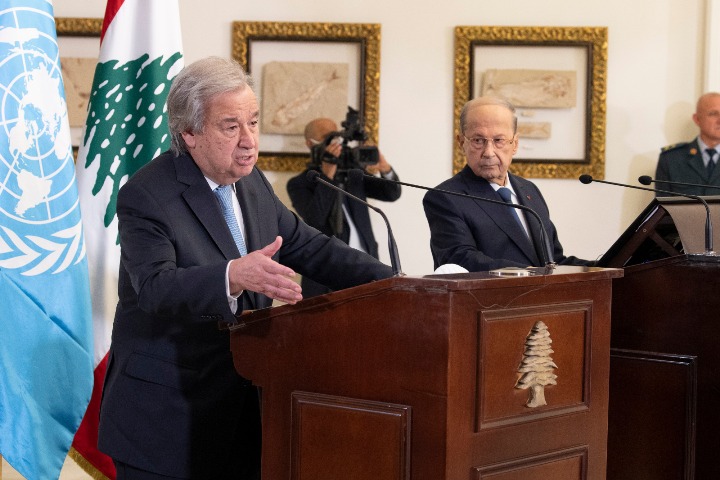UN chief calls for unity among Lebanese leaders, affirms solidarity with citizens
UN Secretary-General Antonio Guterres urged Lebanese leaders on Sunday to work together to solve multiple crises plaguing the nation.

UN Secretary-General Antonio Guterres urged Lebanese leaders on Sunday to work together to solve multiple crises plaguing the nation.
Fractured along sectarian lines, successive Governments have been unable to put the country on a sustainable path forward.
Kicking off a four-day visit, he met with Lebanese President Michel Aoun, saying they had a “fruitful” talk.
One simple message
Subsequently, at a joint press conference at the Presidential Palace, the UN chief called on the international community to strengthen its support.
He told reporters that he was in the country to “discuss the best ways to support the Lebanese people to overcome the current economic and financial crisis and promote peace, stability, and sustainable development”.
"I told the President that I have come with one simple message: The United Nations stands in solidarity with the people of Lebanon", the Secretary-General saod.
Accompanying him were Jean-Pierre Lacroix, Under-Secretary-General for Peacekeeping Operations; Rosemary DiCarlo, Under-Secretary-General for Political Affairs and Peacekeeping; Joanna Wronecka, Special Coordinator in Lebanon; General Stefano Del Col, Commander of the Interim Force in Lebanon (UNIFIL); and Miguel Graca, Director and Coordinator for the visit.
People on the move
President Michel Aoun said that during their meeting, the two had touched upon the issue of the Syrian exodus, stressing the need to “find a new approach to the issue of Syrian displaced in Lebanon”, which has been escalating for more than 10 years.
The Secretary-General acknowledged that “the international community has not done enough to support Lebanon...Jordan, and...other countries in the world that have opened their borders, doors and hearts to refugees” even as some richer and more powerful States have closed their own borders.
The Lebanese example
Mr. Guterres spoke about his previous position as High Commissioner for Refugees, which he held for 10 years, noting the generosity that Lebanon and its people have long shown Syrian refugees.
But he acknowledged that it comes “with a heavy price on the Lebanese economy... society, and – because of the conflict in Syria – on Lebanese security”.
The top UN official held Lebanon up as an example of responsibility that served to underscore the need for the international community to fully support the nation in overcoming its difficulties.
Work together
During his visit, the Secretary-General will meet with a wide range of political, religious and civil society leaders, including women and youth.
And because the country’s emergency response plan is only 11 per cent funded, he called for stronger solidarity to “strengthen support for Lebanon”.
The UN chief also urged all Lebanese politicians to work in unity to solve the crisis.
“The Lebanese people expect their political leaders to restore the economy, provide an effective government and state institutions, put an end to corruption and preserve human rights”, he said, noting that President Aoun spoke “exactly in this direction”.
Given the suffering of the Lebanese people, the Secretary-General maintained that “Lebanese political leaders do not have the right to be divided and paralyze the country”.
Upcoming elections
The top UN official upheld that elections next spring are “essential”, emphasizing that the Lebanese “must be fully engaged in choosing how the country moves forward”.
“Women and young people must have every opportunity to play their full part as Lebanon strives to overcome its many challenges and lays the foundation for a better future”, he flagged, assuring that the UN would support the country “in every step of this journey”.
Resolution 1701
Turning to Israel, the Secretary-General hailed as “essential”, resolution 1701’s full implementation, including maintaining the cessation of hostilities across the Blue Line – a demarcation line between Lebanon and Israel, and Lebanon and the Golan Heights – decreasing tensions between the parties and avoiding all violations.
He took the opportunity to salute the thousands of peacekeepers who, far from their families and countries, continue to work for peace in Lebanon.
Mr. Guteress also stressed that international support for the Lebanese army is more necessary than ever and that the State’s security institutions are vital for its stability.
Over the next few days, the Secretary-General is scheduled to visit the port of Beirut and two projects in Tripoli; tour UNIFUL headquarters in southern Lebanon and the Blue Line; and hold meetings with civil society leaders.
Visit UN News for more.










